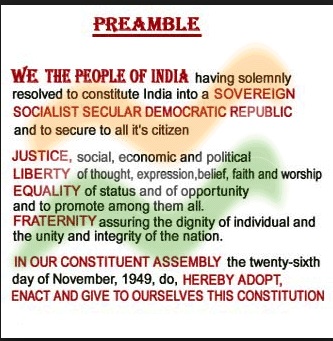-
Chapter 5: PREAMBLE
Introduction
It shows general purpose behind
provisions of the constitutions. However it is
non justifiable and non enforceable
by courts. It is derived from the Objectives
Resolution proposed by Jawaharlal Nehru in the
constituent assembly.
It has amended once by the 42nd amendment [1976] to add the words "socialist" and "secular" were added between the words "Sovereign" and "democratic" and the words "unity of the Nation" were changed to "unity and integrity of the Nation".
Preamble of India

Fig 1: Preamble
Features of the Preamble of India
Sovereign – Means that India is
an independent country and not a dominion of other. Free
to acquire and cede
its territory to other foreign country.
Socialist – Indian version of socialism is democratic socialism unlike communism socialism i.e. involving nationalization of industry and abolition of private property. In democratic socialism public and private sector exist side by side. The aim is to eradicate poverty, injustice and inequality of opportunity. Indian socialism is a blend of Marxism and Gandhism leaning towards Gandhism.
Secular – All religions irrespective of strength are having same status and support from state.
Democratic – Supreme power is with the people. In India, we have indirect democracy where representatives of people exercise power on their behalf. Indian democracy has social, political and economic democracy. Direct democracy is in Switzerland. The devices of it are referendum, initiative, recall, plebiscite.
Republic – It means that the head of the state is not hereditary. Also the supreme power is vested in the people and there are no privileged class i.e. all offices are open to all without discrimination.
Justice – This is of three forms Social (All are treated equally with discrimination), Political (All have access to all office and equal voice in government) and economic (No discrimination on grounds of economic factors)
Liberty – Absence on restraints on activities of individuals and also providing opportunities for development of individual personalities.
Equality – Absence of special privileges to any section and provision of opportunities for all without discrimination.
Fraternity – Through a single citizenship promote a feeling of brotherhood irrespective of caste, religion, sex, creed, and race. It means that the state has to ensure unity and integrity of nation along with dignity of the individual.
Solved Question Papers
Q. Which one of the following objectives is not embodied in the Preamble to the Constitution of India? (UPSC CSAT-2017)
Liberty of thought
Economic liberty
Liberty of expression
Liberty of belief
Ans . B
LIBERTY of thought, expression, belief, faith and worship are mentioned.
Q. The mind of the makers of the Constitution of India is reflected in which of the following?
The Preamble
The Fundamental Rights
The Directive Principles of State Policy
The Fundamental Duties
Ans . A
It contains the grand and noble vision of the Constituent Assembly, and reflects the dreams and aspirations of the founding fathers of the Constitution
Q.The ideal of “Welfare State” in the Indian Constitution is enshrined in its (UPSC CSAT 2015)
Preamble
Directive Principles of State Policy
Fundamental Rights
Seventh Schedule
Ans . B
In a welfare State, the functions of the State are not only the defence of the country or administration of justice or maintaining law and order but it extends to regulating and controlling the activities of the people in almost every sphere—educational, commercial, social, economic, political and even marital.
DPSP thus promotes the ideal of a welfare state as it guides the state in making policies for the socio-economic well being of the people of India.
Quiz
Score more than 80% marks and move ahead else stay back and read again!